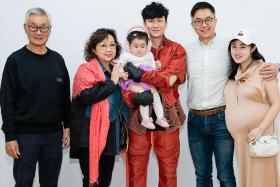KKH sets up Singapore's first human milk bank
Milk collected from donors in $1.37 million pilot project will benefit 900 sick and premature babies
Sick or premature babies who are fed infant formula can now rely on a donor human milk bank for a steady supply of breast milk.
A first in Singapore, the milk bank at KK Women's and Children's Hospital (KKH) is part of a three-year pilot funded by philanthropic organisation Temasek Foundation Cares.
The $1.37 million programme aims to recruit 375 breastfeeding mothers and benefit 900 sick and preterm babies born before 32 weeks of gestation.
The milk will be processed based on strict protocols adapted from guidelines widely implemented by established milk banks in developed countries, said Dr Chua Mei Chien, a neonatologist at KKH and the director of the programme.
The launch comes against a backdrop of sick and premature neonates - babies less than a month old - who have been fed formula milk, either partially or exclusively, because their mothers are unable to lactate.
Babies born before 32 weeks of gestation have to be hospitalised for about two months before they can be discharged.
At KKH, up to 80 per cent of these infants in the neonatal intensive care unit and special care nursery have to receive formula milk, which Dr Chua said predisposes the infants to feeding issues.
It also raises the risk of a potentially lethal condition known as necrotising enterocolitis - intestinal damage that typically occurs in the second to third week of life in premature, formula-fed infants.
"With the availability of the pasteurised donor milk, we will be able to optimise the nutritional intake of this fragile group of infants in the early days of their life, as well as to offer them a better chance of good long-term health outcomes," said Dr Chua, who added that breast milk contains white blood cells and antibodies that protect a baby against infections.
SCREENED
Donor mothers have to be screened and tested before they can donate excess breast milk.
It will be tested for bacterial contamination, then pasteurised at 62.5 deg C for 30 minutes. It is then stored in freezers until it is dispensed. The whole process can take up to four days.
To ensure full traceability from donor to recipient, the milk bank will create individual donor records.
In the first year of the pilot, donor milk will be available only at KKH, which sees two-thirds of preterm births here.
It will be made available to Singapore General Hospital and National University Hospital in the next two years.
Presidential candidate and former Speaker of Parliament Halimah Yacob, who launched the milk bank, commended KKH for helping premature and sick babies.
"As a mother of five and one who breastfed all my babies, I understand the nutritional importance of breast milk for children," she said.
Also present was another presidential hopeful, Mr Mohamed Salleh Marican, Temasek Foundation Cares treasurer, who said its board had unanimously approved the project.
He said: "All of us felt strongly that this is important."
The Islamic Religious Council of Singapore has said it is acceptable for premature Muslim babies to drink donor milk because it is for the child's well-being, much to Madam Nor Adliyah Haryanie's relief.
The 35-year-old's son, born 10 weeks early, is on formula milk at KKH because she is unable to produce enough milk.
She said: "At first, I thought if I said yes to donor milk, people around me would ask questions... but after listening to (KKH), I thought the idea is not bad. I am open to it."
Mothers who want to donate their excess milk can e-mail KKH at milkbank@kkh.com.sg, visit www.kkh.com.sg/milkbank, or call 6394- 1986.
Get The New Paper on your phone with the free TNP app. Download from the Apple App Store or Google Play Store now



